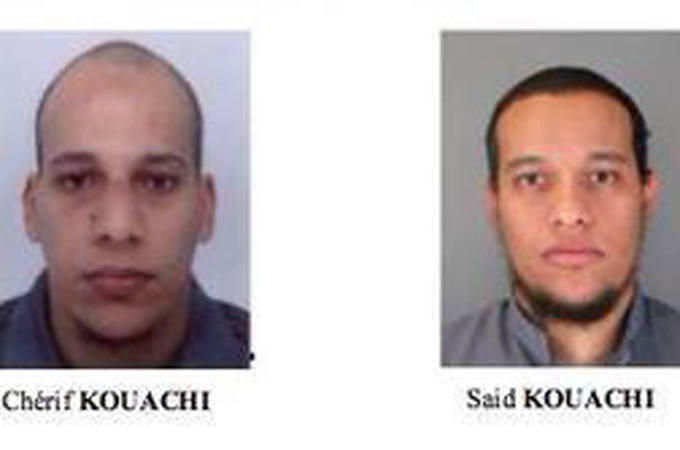Search narrows for Charlie Hebdo suspects
Police carrying out extensive search operation in Picardy in northern France, where alleged attackers were spotted.

Heavily armed anti-terrorism police have swooped on residential areas northeast of Paris in a extensive manhunt for two brothers suspected of being the gunmen who killed 12 people at a satirical weekly in the French capital.
Officers said the operation began after witnesses sighted the two men said to be responsible for the attack on Charlie Hebdo in a town in the Picardy region, adding that their hijacked getaway car was found in the same area.
Keep reading
list of 4 itemsWall Street Journal cuts Hong Kong staff, shifts focus to Singapore
Abu Dhabi-backed group ends bid to take over Telegraph newspaper
Two Russian journalists arrested over alleged work for Navalny group
The manager of a petrol station near the Villers-Cotteret commune in Picardy said he “recognised the two men suspected of having participated in the attack against Charlie Hebdo,” police sources said.
|
|
| Al Jazeera’s Laurence Lee reports from Paris on the French media’s reaction to the attack |
Villers-Cotteret is located approximately 80km northeast of Paris.
The latest getaway car of the attackers, who hijacked multiple vehicles after the incident, was found abandoned around the same area.
The identity cards of the suspects and petrol bombs were found in the abandoned car.
Two of the alleged attackers, who are also brothers, have been identified as 32-year-old Said Kouachi and 34-year-old Cherif Kouachi. Police said they are French-born sons of Algerian-born parents.
The two men, along with another person who is believed to be a teenager, are thought to have carried out Wednesday’s attack before escaping in a car.
In a news conference late on Thursday, Interior Minister Bernard Cazeneuve said the younger brother was known French security forces, adding that he had had links to al-Qaeda in 2004 and 2005.
He added that Said Kouachi had been under security survellience.
2012 interview with Charlie Hebdo’s Stephane Charbonnier who died in the attack
Suspect jailed before
Earlier, police said that Kouachi was imprisoned for 18 months for trying to travel to Iraq to fight for armed groups.
Nine people have been detained in relation to the investigation, Cazeneuve also said.
Al Jazeera’s Barnaby Phillips, reporting from Picardy, said there had been intense activity by counterterrorism police in the region where the suspects had been spotted.
| Newspapers refuse to be silenced |
|
L’Yonne : La presse assassinée [The murdered press]
L’Independant : Je suis Charlie [I am Charlie]
L’est eclair : Nous sommes tous Charlie [We are all Charlie]
La Provence : Charlie Hebdo – Le jour noir [Charlie Hebdo – The black day]
Le Parisien : Ils ne tueront pas la libertée [They will not kill freedom]
The Guardian : ‘An assault on democracy’
The Daily Telegraph : War on freedom
The Sun : Non!
The National : The world stands with France
The Times : Attack on freedom
|
“French police seem to be aiming to capture the suspects if and when they surface to get resources, such as food and petrol,” he said
Tensions in Paris were high on Thursday as France began a day of national mourning, after the controversial Charlie Hebdo magazine was attacked by three armed men on Wednesday. Eleven people were also injured in the attack.
Four cartoonists working with the publication, including the editor Stephane Charbonnier, known as “Charb”, were among the dead.
The other cartoonists killed were known as Cabu, Tignous and Wolinski.
Meanwhile, in another incident, a police officer was killed on the outskirts of Paris on thursday. Prosecutors said the latest shooting was also being treated as a “terrorist act”.
It was not immediately clear if that shooting was linked to the previous day’s attack at the Paris-based satirical magazine, where two policemen were among the dead.
Officers have identified and released the photographs of the two brothers suspected to be involved in the Charlie Hebdo attack.
Witnesses said the attackers spoke fluent, unaccented French, and shouted “Allahu Akbar!” as they opened fire in the noon-time attack on the Charlie Hebdo headquarters, located near Paris’ iconic Bastille monument.
Charlie Hebdo’s depictions of Islam, including the Prophet Muhammad, had drawn condemnation and threats before. It was firebombed in 2011 – although it also satirised other religions as well as political figures.
Eiffel Tower goes dark
Tens of thousands of people have taken part in vigils across France on Wednesday and Thursday in commemoration of the victims. The Eiffel Tower went dark on Thursday night as large rallies were held in central Paris.
Wednesday’s attack triggered global outrage and condemnation.
French President Francois Hollande said it was a “terrorist act of exceptional barbarism”, adding that other attacks have been thwarted in France in recent weeks.
 |
| The two brothers have been identified as Said Kouachi and Cherif Kouachi |
Fears have been running high in France and other countries in Europe that fighters returning from conflicts in Syria and Iraq will stage attacks at home.
The security alert in the country has been raised to the highest level and protective measures at houses of worship, stores and media offices immediately reinforced. Schools across the French capital have also been closed.
There was no immediate claim of responsibility for the Charlie Hebdo attack.
On Wednesday, France’s Muslim leadership sharply condemned the shooting as a “barbaric” attack and an assault on press freedom and democracy.
The body represents France’s Muslim community, which is Europe’s biggest and estimated to number between 3.5 million and 5 million people.
Tariq Ramadan, professor of Contemporary Islamic Studies at Oxford University, discusses the impact of the Charlie Hebdo attack in Paris.